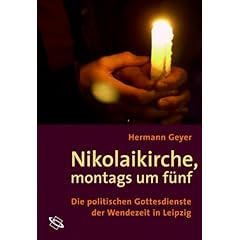
The Holy Disorder campaign was launched today with a light sculpture at the
tower block of the regional parliament in Erfurt, which once housed the communist-led government of the district of Erfurt. As the evening progressed the words and phrases taken from the final documents of the
Ecumenical Assembly that were projected onto the building could be seen more and more clearly, while inside the building the texts themselves were projected in rolling news fashion, interspersed with words such as "courage", "justice", "peace" - all this to a sound of extracts of the texts, clips from a Bach mass and

the ringing of church bells. Bishop Christoph Kähler said that this was the "
writing on the wall" that East Germany's leaders refused to

recognise. The artist,
Ingo Bracke, explained that he de-constructed the texts in order to reconstruct the component parts in a new way. He said that of all the texts he had read for the project, the one that spoke to him most, was the four pledges in the
Letter to Children.
Dagmar Schipanski, the president of the regional parliament said that the non-violent revolution would not have been possible in the way that it happened without the Ecumenical Assembly.

Particularly poignant was the presence of
Heino Falcke, the retired Dean of Erfurt who turns 80 in May and who is the spiritual father of the Conciliar Process in the GDR that led to the Ecumenical Assembly. Bishop Christoph Kähler said of the texts that lie behind the light sculpture, "The call for more solidarity, taking responsibility in society, and a way of dealing with human beings and the world that is responsible both ecologically and economically, is relevant and something we need to think about even today, 20 years after it was drawn up." Below there are some pictures of the event:






 Today is Blog Action Day, when bloggers are asked to blog on Climate Change. To mark the day I am linking to this paper by Heino Falcke, part of which he read at the symposium in Utrecht where he received the ecumenical prize of the Council of Churches in the Netherlands. In the paper, Falcke is looking back at the Ecumenical Assembly in the GDR, which in many respects was a forerunner of the peaceful revolution of 1989. The assembly was challenged to face the global challenges of justice, peace and creation in the perspective of the GDR. The result was a catalogue of changes for the GDR and which provided a template for the demands of the citizens' movements and new political parties formed in mid-1989. But Heino Falcke points out now that the Ecumenical Assembly was not only directed at political changes in the GDR, but an "Umkehr", a turn to a preferential option for the poor, for non-violence and for the preservation and protection of life in the global context. Climate change was hardly known as a concept back in 1989, but this is what Falcke now has to say about the environment as seen through the texts of the Ecumenical Assembly of 1989:
Today is Blog Action Day, when bloggers are asked to blog on Climate Change. To mark the day I am linking to this paper by Heino Falcke, part of which he read at the symposium in Utrecht where he received the ecumenical prize of the Council of Churches in the Netherlands. In the paper, Falcke is looking back at the Ecumenical Assembly in the GDR, which in many respects was a forerunner of the peaceful revolution of 1989. The assembly was challenged to face the global challenges of justice, peace and creation in the perspective of the GDR. The result was a catalogue of changes for the GDR and which provided a template for the demands of the citizens' movements and new political parties formed in mid-1989. But Heino Falcke points out now that the Ecumenical Assembly was not only directed at political changes in the GDR, but an "Umkehr", a turn to a preferential option for the poor, for non-violence and for the preservation and protection of life in the global context. Climate change was hardly known as a concept back in 1989, but this is what Falcke now has to say about the environment as seen through the texts of the Ecumenical Assembly of 1989:














